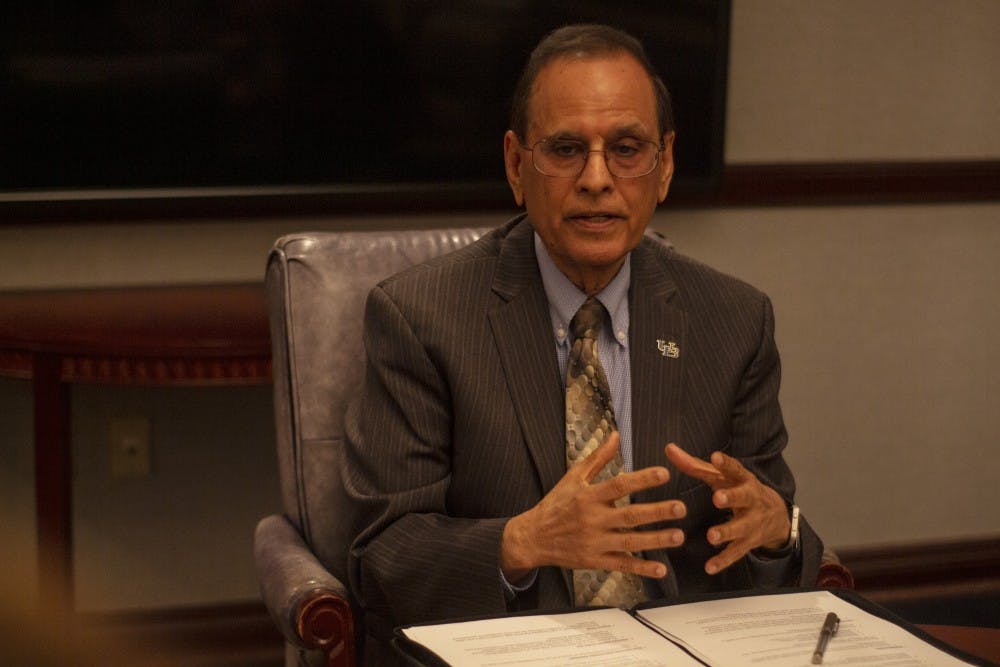Satish Tripathi has been UB president for eight years and said he’ll continue to serve the role as long as he feels like he can “make a difference.”
Or –– as he joked –– as long as he doesn’t get fired.
Tripathi met with Spectrum editors on Monday on the fifth floor of Capen to discuss everything from the university’s recent architectural implementations to this year’s most pressing topics, including protests for both graduate stipends and more black faculty. Tripathi began the 30-minute discussion by going over UB’s social fraternity and sorority suspension, which came after freshman Sebastian Serafin-Bazan died following a possible hazing incident involving fraternity Sigma Pi.
Tripathi said the committee reviewing Greek life, which is chaired by the dean of the Graduate School of Education, consists of administration, faculty members, Greek life members, students who aren’t part of Greek life and alumni. He hopes the committee will “really examine our Greek life policies and structures” and come up with the report by the end of the summer.
“We got to pause, we got to think about what is it that we're doing, why we're doing it and what's wrong with it,” Tripathi said of UB’s decision to halt social Greek life activities. “And to do that, really, you have to take a timeout for all these activities. And that's what we did.”
“We really definitely want to re-examine what you do and [find out] how we make changes, what changes need to be done. And you can't do that just by Dr. Weber and I sitting down. [We] said, if we're going to do right, we need to really think about this with the faculty, staff and students who are all part of this and get their input and see what the best practices are.”
Tripathi held off on answering a question about what he’d want to see happening with Greek life, saying he can answer that question once he has the finalized report, as he doesn’t want to “preach to the committee,” which he would prefer to use other people’s input and not his own.
Tripathi said memorializing Serafin-Bazan with a vigil after the tragedy would “depend on [his] family” and UB would wait for them to “be agreeable to what we can do.” He said UB will work with the family to see what they would like to do moving forward in terms of memorializing the student.
Later in his discussion with The Spectrum, Tripathi discussed recent protests on campus.
Members of the Living Stipend have recently disagreed with UB’s upcoming $20-million One World Cafe, questioning the price of the structure since the lowest graduate stipend after fees comes out to roughly $9,000.
Tripathi responded, saying that although both are “important,” the money going into the food market is “one-time money.”
“You can't use one-time money to give a raise and say [it] solved the problem,” Tripathi said.
He then said departments set the stipends and the English department has “come up with a plan,” while other departments are developing plans.
“So we have heard and we have worked with the departments in working on that, but [comparing] those is trying to compare apples and oranges, the money from here goes there, and then what happens next year?”
Tripathi also responded to the May Day Rally, which students held on International Workers’ Day last week, and said the “death fee” they protested and represented by bringing a coffin to his office wasn’t a UB fee, but rather a SUNY health insurance requirement for international students. Tripathi said the “small fraction added” to the insurance allows for a “comprehensive insurance that’s needed.”
The $80 insurance charge transports students’ bodies back home in the case of the student dying or facing a medical emergency, so families wouldn’t be charged an upwards of $40,000, Tripathi said.
Tripathi said he felt the rally’s “death fee” term was more of “coming up with a slogan without thinking about what it is, actually.”
He also shared responses on other recent demonstrations, such as the Pre-Law Chapter of the National Black Law Students Association’s March demonstration in the Student Union, where students and faculty demanded more black faculty and representation on campus.
Tripathi said that while he hadn’t “recognized facing anything with respect to discrimination” within academia as the first person of color to be UB president, he understood that a lack of representation in faculty was a “national issue.”
He talked about SUNY’s PRODiG program, which aims to promote representation for “historically underrepresented” faculty in SUNY schools, as well as UB’s efforts to hire more diverse faculty. Tripathi also said he rejected hiring pools during his time as provost if it did not have “appropriate representation.”
Given that a Boston court announced a guilty verdict for UB alum John Kapoor just last week, Tripathi also discussed UB’s steps toward possibly revoking Kapoor’s honorary degree and removing his name from John and Editha Kapoor Hall on South Campus.
Tripathi said the UB Council will vote on the decision to possibly rename the building during the June 3 meeting and it has to be approved by the SUNY chancellor and Board of Trustees.
He said, however, that the same committee that gave Kapoor his honorary degree would make the decision to rescind the degree. Tripathi said the committee will be “meeting soon.”
Tripathi also touched on a new building which will be making its way onto UB’s campus in the near future: a wellness & recreation center.
“This is something that's so important for our students, I mean, really bringing the services together, not just being able to exercise but bringing all these services for health and wellness at the same location. Think about One Capen but much bigger,” Tripathi said.
Tripathi said the project has been “on the books for a while,” and the concept will be “voted by the students.”
“As you know, it really has to be approved so that we can build it, but I'm very excited,” Tripathi said. “I mean, this is really something that provides students a 21st-century place to not only do the academic aspect, but also the mental and physical aspect of health. That's so critical.”
The news desk can be reached at news@ubspectrum.com

Brenton J. Blanchet is the 2019-20 editor-in-chief of The Spectrum. His work has appeared in Billboard, Clash Magazine, DJBooth, PopCrush, The Face and more. Ask him about Mariah Carey.

Jacklyn Walters is a senior communication major and The Spectrum's managing editor. She enjoys bringing up politics at the dinner table and seeing dogs on campus.
Tanveen Vohra is a former senior news editor and covered international relations and graduate student protests.






